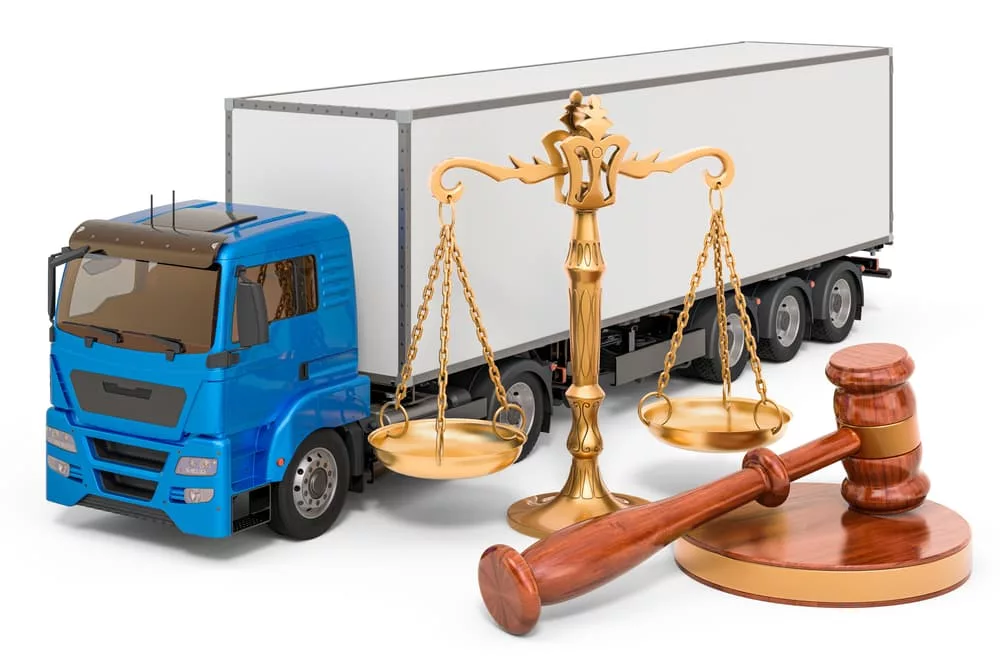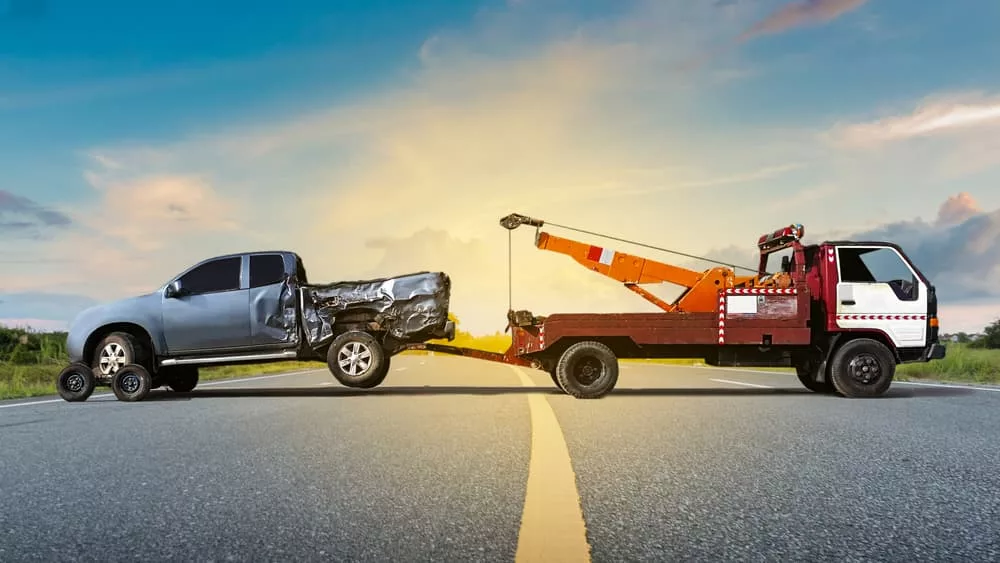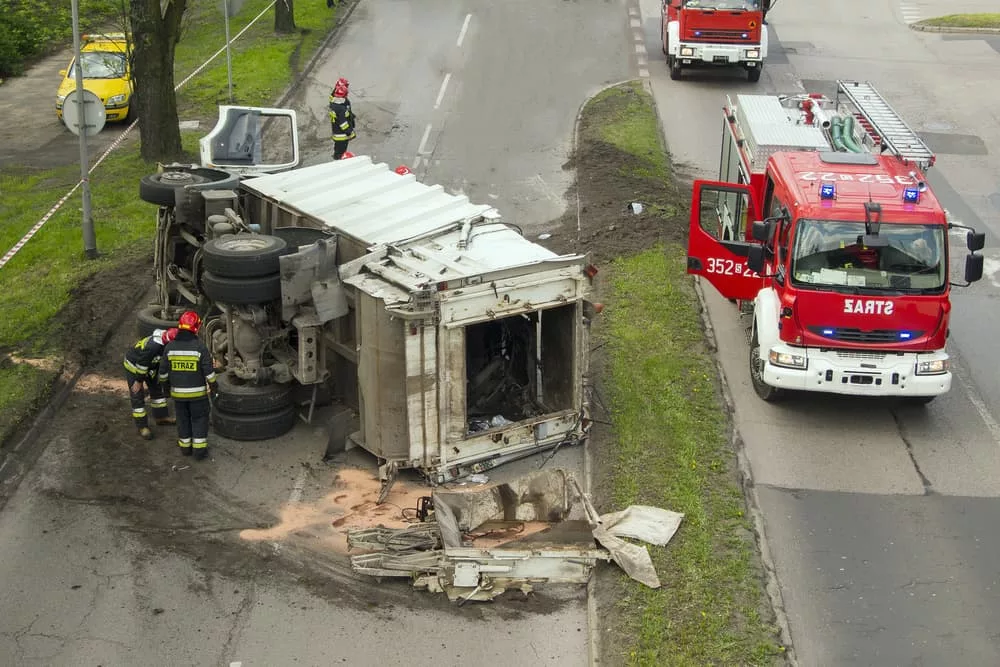After a truck accident, you may face many negative consequences, including serious injuries and tough financial burdens. Fortunately, you don’t have to carry these burdens alone, as a truck accident attorney can fight to protect your rights and pursue fair compensation on your behalf.
But what type of financial recovery can you seek after a semi-truck collision? Do you need to sue to obtain compensation?
A truck accident lawyer can provide personalized answers to questions like these and tailor a plan to get you the most favorable case result.
Truck Accidents Occur Frequently, Resulting in Extensive Property Damage and Injuries
An abundance of semi-trucks transport goods and materials to their intended locations, supporting our lives and the economy.
While trucks serve a positive purpose, they can also pose great threats on the roads. By simply looking at a commercial truck, you can only imagine the destruction and injury one can cause in a collision. Truck accident victims know this all too well.
In a recent year, there were over 400,000 police-reported commercial truck accidents. Of these accidents, over 100,000 involved injuries.
The following year, the number of truck crashes involving injuries jumped 12 percent. Truck accidents happen every single day, with trends showing consistently high numbers of injuries and fatalities every year.
What Causes Semi-Truck Collisions?
Determining the cause of your truck accident can be one of the most challenging parts of your case. Multiple things are likely to go wrong at once, which means the cause of your collision may be difficult to pin down. This is also why multiple parties can share liability for a truck accident.
Some of the reasons trucking collisions most often occur include:
- Distracted driving
- Driver fatigue
- Driving while under the influence
- Speeding
- Aggressive driving
- Brake or mechanical failure
- Improperly loaded cargo
- Driver inexperience
- Negligent hiring practices
Deciphering the cause of your truck crash is one of the first steps in your accident investigation. Once you know what actually caused your collision, it’ll be easier to determine who can be financially liable.
Common Truck Accident Injuries
Trucking accident victims rarely walk away from a collision unscathed.
Depending on the type of collision, victims often suffer the following injuries:
- Burns
- Lacerations
- Fractures
- Head and neck injuries
- Traumatic brain injuries
- Crush injuries
- Back and spinal cord injuries
- Internal injuries
The problem with semi-truck accident injuries isn’t just the injuries themselves but the high likelihood of certain injuries developing and worsening. For example, traumatic brain injuries occur frequently when victims suffer a strong and sudden blow to the head.
You may recover well from a TBI, but in many cases, brain injuries can lead to scary, long-term effects, like cognitive impairments, visual changes, and even coma.
What You Can Sue for After a Commercial Truck Collision
Evaluating your damages will determine the value of your case. You can sue for several damages following a truck accident, depending on the specifics of your case and related losses.
Compensatory damages, or damages that serve to compensate you after a collision, represent your economic and non-economic losses.
Economic Losses
Economic damages are monetary losses stemming from your accident. Because they are monetary losses, they are easier to prove, and evidence is often readily available.
Medical Expenses
Truck accidents can result in serious, life-threatening injuries that require extensive treatment, and medical care can cost thousands of dollars.
You’ll need to total the cost of your medical expenses for your accident-related injuries.
You may recover financial compensation for:
- Ambulance transport
- Emergency room visits
- Hospitalizations
- Surgery
- Medications
- Diagnostic tests
- Therapy and rehabilitation
- In-home care
Not only may you seek financial recovery for your past medical expenses, but you may also get monetary coverage for future costs. To get money for the medical care you may need in the future, you’ll need to provide sufficient documentation proving the severity of your injuries and how they’ll affect you in the future.
Lost Earnings
Your financial burdens may significantly worsen if you have to take time off of work because of your injuries.
A majority of truck accident victims end up taking some time away from work, as it’s often necessary to give your body a chance to heal. Those who work in physical or high-stress jobs usually benefit most from time off.
With time away from work also comes missing out on your earnings. You may have some paid time off racked up, but even if you do, those days may quickly run out. Once they do, you’re not making any money.
If you need time off from your job because of your truck accident injuries, you can total the amount of your lost income and include that in your damages.
Diminished or Lost Earning Potential
Not only do some accident victims need to take time away from work, but some may not have the opportunity to return to the same work they did pre-collision. Your injuries may impede your potential to make a living, either by diminishing your capacity to work or removing your ability to work altogether.
To pursue compensation for diminished or lost earning capacity, you’ll need to prove you have suffered from a permanent injury that diminishes your employability. Evidence can aid in assigning a value to this loss and helping you pursue compensation.
Property Damage
Truck accidents can result in extensive damage to your property, like your vehicle. You may have the opportunity to seek compensation to cover the value of your damaged property, including repairing or replacing your vehicle.
You can also get compensation for other property, including your cell phone, items destroyed in your vehicle, and other property impacted by your collision.
Non-Economic Losses
Non-economic losses also relate directly to your accident, but they represent your intangible losses. For this reason, they are harder to prove. These damages regularly require more extensive evidence to substantiate.
Pain and Suffering
Pain and suffering is an umbrella term that covers a variety of non-monetary issues that result from a truck accident.
These matters affect your physical, mental, and emotional well-being, and can include:
- Physical pain from your injuries, both immediate and long-term
- Mental anguish
- Emotional distress
- Depression and Anxiety
- Sleep problems
Along with the difficulty of suffering from these issues, you may need specific treatment to help ease some of the pain and suffering. This means you can also have the chance to receive compensation for treatment, including medication, counseling, and rehabilitation.
Disability
Truck collision injuries might leave you with a disability, whether permanent or temporary. Not only can you pursue compensation for the direct impact of your disability on your life, like your ability to work and medical treatment, but you may also get monetary recovery for other ways your disability affects your lifestyle, relationships, and mental well-being.
Scarring and Disfigurement
Certain injuries, like burns and lacerations, can leave you with permanent scarring and disfigurement. Additionally, your injuries may require amputation(s). Suffering from changes to your appearance or disfigurement can be tough on the body and also your mental and emotional health.
Loss of Enjoyment of Life
Simply put, truck accident injuries can damage your life, especially when they leave you to face the life-altering consequences of your injuries. This loss of enjoyment of your life has a quantifiable value under the law.
Loss of enjoyment of life damages compensate you for both the physical and emotional components. For example, you may pursue financial recovery for your inability to perform certain tasks or hobbies you once enjoyed or participate in leisure activities as you did before.
Punitive Damages
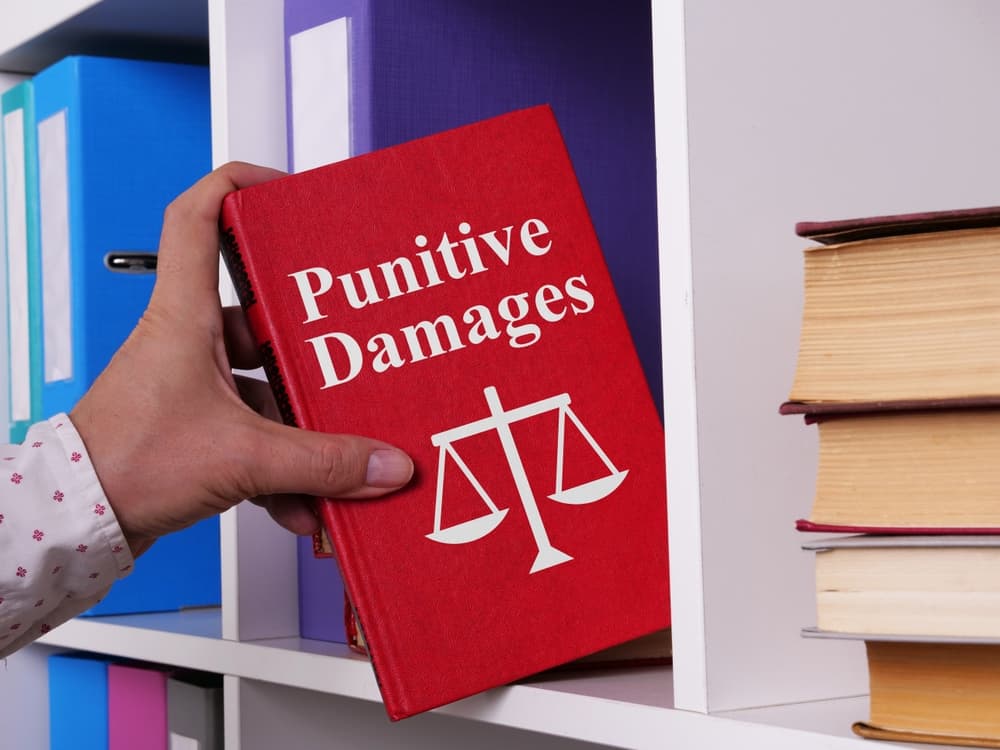
Punitive damages, also known as exemplary damages, differ from compensatory damages. Instead of compensating you for your physical harm and losses, punitive damages apply in certain cases as a way to punish the defendant for their wrongdoing and deter potential future actors from engaging in the same actions.
Punitive damages are only available in cases based on more than just negligence. Instead, depending on state law, you may pursue these damages if the defendant(s) in your case acted in a willful, malicious, or reckless manner, resulting in your collision and injuries.
Who to Sue: Liability for Semi-Truck Collisions
Liability is key in truck accident cases. To properly pursue damages, you’ll first need to determine who caused your accident.
Depending on the details of your accident, any of the following parties can be at fault:
- The truck driver
- The trucking company
- The owner of the commercial vehicle
- The owner of the cargo
- The party responsible for truck maintenance and repairs
- The party in charge of loading the cargo onto the truck
- Product designers, manufacturers, distributors, and retailers
Generally, whoever’s actions or inaction contributed to the truck crash can be liable. In many truck accident cases, more than one party is responsible. When multiple parties share liability, you can pursue financial recovery from each one.
Pursuing Compensation Following a Truck Accident
The road to compensation after a truck collision is not always straight. The right way to pursue monetary recovery for your losses depends on your specific case. A lawsuit is not always necessary but may provide the best opportunity for rightful payment.
Filing an Insurance Claim
Due to a commercial vehicle’s large size and capacity to cause injury and damage, trucks have coverage by substantial insurance policies. Other parties involved in the trucking industry must also have insurance protection for a collision.
Depending on state law, you can file a collision claim with the at-fault party’s insurance through a third-party insurance claim or your own insurance. If you file a claim under your own insurance but the other party caused it, your insurer can later pursue reimbursement.
If you can get proper compensation through the insurance company to cover your damages, you don’t have to worry about taking any additional steps. However, insurance companies are notoriously difficult to deal with, so you may not get a fair settlement through a collision claim alone.
Filing a Personal Injury Lawsuit
When you file a personal injury lawsuit, you’re seeking court assistance. In your court petition, you can list your reasons for filing a claim and ask the court to consider your request for relief.
During your lawsuit, you’ll build your argument and request evidence to strengthen your claim. You can attempt to settle your case at any time during the life of your lawsuit, which most often occurs before your case goes to trial. A successful pre-trial settlement can resolve your case and prevent you from needing to go to court.
Can I Sue if I Lost a Loved One in a Trucking Collision?
In the most unfortunate cases, truck accident victims succumb to their injuries. If you lost a loved one in a commercial truck collision, you may pursue compensation for your untimely loss.
When you lose a loved one, you will file a wrongful death claim. In a wrongful death suit, you can seek monetary recovery for the economic and non-economic losses associated with the victim’s death, including funeral and burial expenses and loss of financial support.
An accident lawyer can determine whether you have a valid wrongful death claim and provide much-needed guidance.
Time is Limited to Sue – Consult a Truck Accident Attorney Today
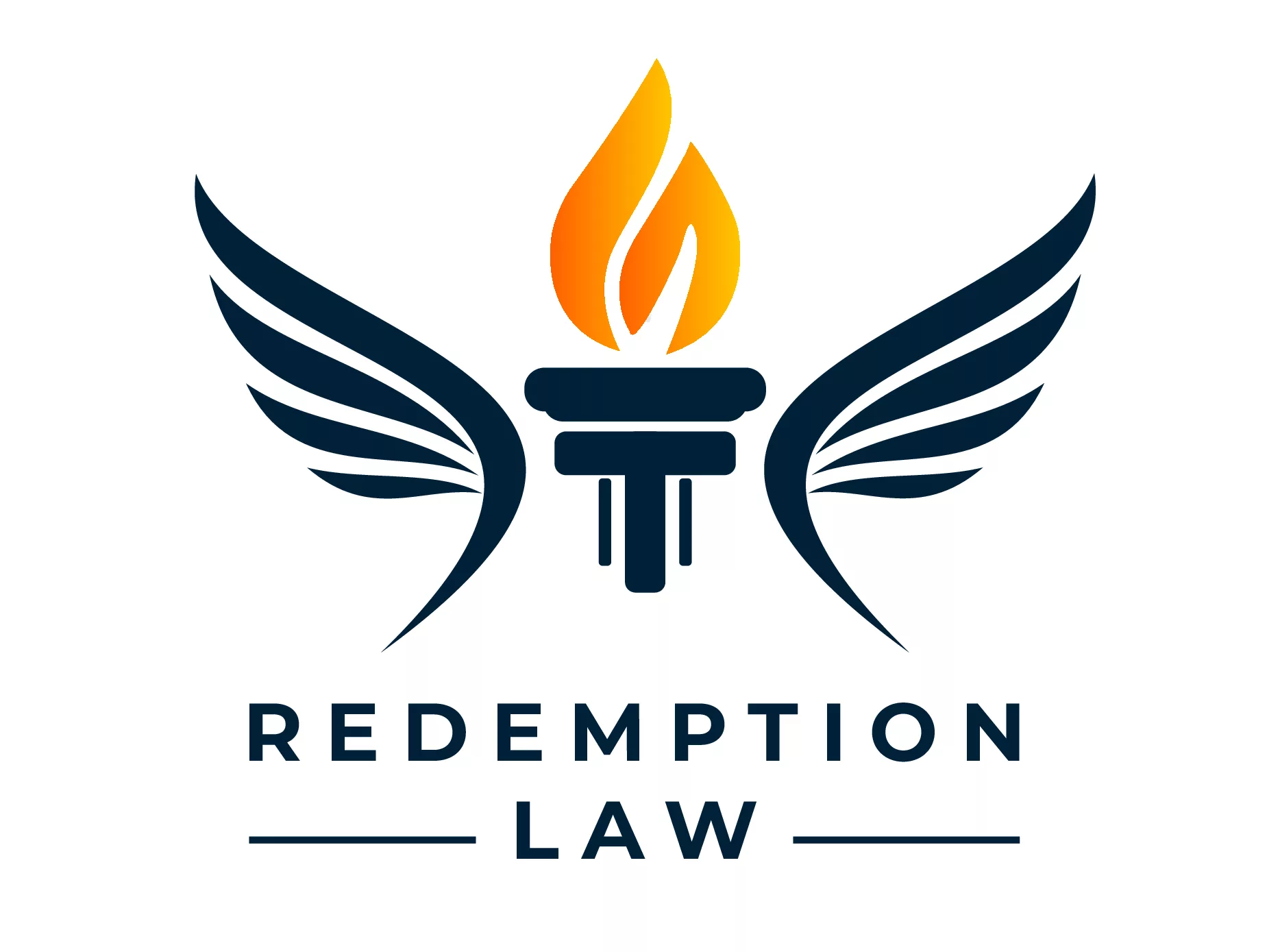
There’s no need to file a case on your own when you can get qualified legal representation. A personal injury lawyer can file your case before the statute of limitations expires and fight aggressively to get you the case outcome you deserve.



